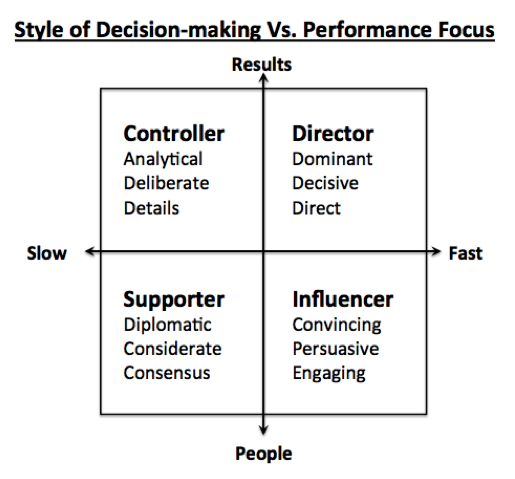 Warning: do not use this slick all-purpose assessments for screening out people. However, it’s useful for becoming a better interviewer and screening in people.
Warning: do not use this slick all-purpose assessments for screening out people. However, it’s useful for becoming a better interviewer and screening in people.
DISC and all its variants (Calipers, Myers-Briggs, Predictive Index, etc.) should never be used to pre-screen people. At best, and if they’re not faked, these “tests” only predict preferences, certainly not competencies. At worst, they prevent diversity by eliminating the chance to see and hire people who can achieve great results but use a style different than the expected. (Note: Use these types of style indicators after you’ve narrowed the selection to 3-4 people who you’ve determined can meet the performance objectives required for success.)
Despite this predictive limitation — although it will be argued by those who use or sell them — the DISC style preferences are quite helpful for understanding how people communicate, make business and hiring decisions, and interact on-the-job.
To determine your dominate DISC style, look at the descriptions of the four styles in the graphic and select the one that best describes you. Then to validate this, answer these two questions:
Question 1: are you impatient or not? If you’re very impatient and would rather make decisions with no information, put yourself on the far right in the diagram. If you’re still trying to figure out your answer to this question, put yourself on the far left. Everyone else can put themselves somewhere in between.
Question 2: are you more into results or relationships? People who are more focused on the success of the project and are less sensitive to the needs of the people involved fall somewhere in the top-half of the grid. Those who are more concerned with the people involved are in the bottom-half.
Your answers to these simple questions categorize you into one of these four dominant styles:
Directors (impatient and results): these are people who are driven and results-oriented. They are dominant, frank, make quick hiring decisions based more on intuition than facts, and at times can be perceived as heavy-handed or overbearing.
Influencers (impatient and people): these people are typically extroverted, friendly, and persuasive, possessing the classic salesperson persona. They quickly decide whom to hire based on first impressions.
Supporters (patient and people): these people are the consensus builders — HR people, diplomats, and counselors. When hiring they look for people who “fit” with the organization and are team players.
Controllers: (patient and results) these people are the classic analyzers and techies. They tend to focus on experience and technical expertise when making hiring decisions.
Generally speaking, people are more comfortable with those who are similar to them. This includes their own dominant DISC style and the two adjacent styles. They tend to have the most conflict with their anti-DISC style — their diagonal opposites. However, by forcing themselves to adopt this style, they can improve interviewing accuracy as well as better understand some of the cause of their interpersonal disagreements. Here’s how:
- Directors need to become more like Supporters, slowing down long enough to hear everyone’s viewpoint, especially those who disagree with you, using evidence rather than intuition and gut feelings, before deciding.
- Influencers need to become more like Controllers, getting evidence of the candidate’s actual performance and ability rather than overvaluing first impressions and personality.
- Supporters need to become more like Directors, judging the person more on the results achieved and not just whether the person fits the culture and is a team player.
- Controllers need to become more like Influencers, determining if the person can work with a variety of different people, not just assessing their technical competency.
DISC has its good and bad points. Since you can figure out your DISC style in a few minutes, and even the not-so-clever can fake it, caution is urged on how it should be used. It should never be used for screening purposes for a number of reasons, but has value from a communications and self-development standpoint.
From a hiring standpoint it can be used to make better assessment decisions on two fronts. For one, the interviewer can become more open-minded and objective by collecting information using the best techniques of each style. For another, during the interview observe how candidates have modified their styles depending on the circumstances.
Some people are more flexible and others more rigid. When used as part of fact-finding this way, a DISC style assessment can help the interviewer better understand a candidate’s flexibility, cultural fit, and the person’s ability to work with and manage others. For something so simple, this has great value as long as it’s used properly.